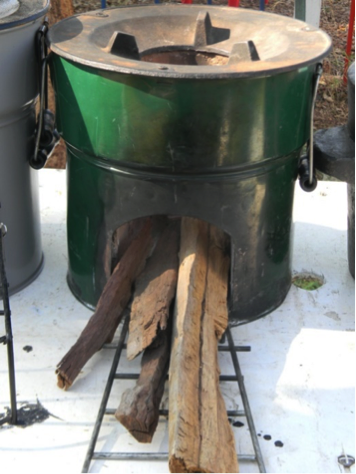How Efficient Cook Stoves Can Improve the Environment and Women’s Health

Miriam Dangasuk, Research Fellow, Resource, Environment and Energy Policy Lab
mdangasuk@africacfsp.org
The World Bank estimates that a cumulative 40 million worker years are wasted annually on gathering fuelwood for use in traditional cookstoves. This work is largely done by women, and it prevents them from otherwise using their free time for income-generating activities or schoolwork. Moreover, in many African countries, women and children spend hours cooking on these traditional cookstoves, which has led to poor health outcomes. Thus, emphasis needs to be put into the adoption and usage of improved cookstoves.
Introduction
The World Health Organization (WHO) found that 600,000 people die annually in Africa due to chronic illnesses caused by inhaling toxic fumes generated by traditional cook stoves and inefficient fuels such as firewood, coal, dung, kerosene etc. Traditional cook stoves do not properly combust, and as a result, 75% of the heat is lost. Hazardous substances like carbon monoxide, nitrous oxides, particulate matter and black carbon are released, disproportionately affecting women and children’s health. Furthermore, acute respiratory infections develop from exposure to smoke during cooking.
Comparison of Improved Cook Stoves in Africa
A 2014 landscape report on improved cook stoves in sub-Saharan Africa demonstrated that they are more fuel efficient and emit fewer toxic fumes than traditional cook stoves. There are a variety of types of improved cook stoves, which include 1) basic chimney biomass and coal cookstoves, (ISO Tier 0–2 for fuel efficiency, Tier 0–1 for emissions), 2) basic portable wood and charcoal improved cooking solutions, ICS (Tier 1–2 for efficiency, Tier 1 for emissions), and 3) highly fuel- efficient intermediate ICS (Tier 2–3 for efficiency, Tier 1–2 for emissions). Clean cooking solutions include low polluting technologies (ISO Tier 3–4 for emissions), as summarized in the table below.

Challenges of Existing Policies Supporting Improved Cook Stoves in Africa
The World Bank found that only 11% of people across Africa currently use improved cook stoves. Modified cook stoves are powered by a range of sources, such as liquefied petroleum gas (5%), kerosene (7%), electricity (6%), ethanol, solar (<1%), and biomass (less than 0.1%). Oftentimes, a variety of fuels are used simultaneously. Furthermore, access to electricity does not have a direct correlation with households using improved cook stoves and efficient fuels. This suggests that women, who are the primary users of cook stoves in sub-Saharan Africa as indicated by World Bank, have inadequate exposure to improved cookstoves.
Moreover, different countries have adopted different policies to support their choice of cook stoves being used. For instance, in 2018, Ethiopia introduced the National Programme for Improved Household Biomass Cook Stoves Development and Promotion for the purpose of distributing nine million cook stoves. However, the program does not identify how it will target women specifically. Additionally, there is no mandated government institution to lead the clean cooking sector, as it is instead fragmented between several ministries, such as the Ministry of Agriculture and Forestry, Ministry of Gender, Social Welfare and Religious Affairs, Ministry of Housing, Physical Planning and Environment, Ministry of Environment, and Ministry of Health. In Kenya, the government removed 16% VAT on liquefied petroleum gas in 2016 and increased the price of Kerosene by $0.07 as a method to inhibit kerosene use and encourage the adoption of modified cook stoves and clean fuel. The Kenyan government also reduced import duties on energy efficient cook stoves by 15%. Nonetheless, cook stove prices remain too high for Kenyans. On the larger level, there is insufficient financial incentives and opportunities to promote a restructured cook stove consumer market.
Policy Suggestions to Encourage Improved Cook Stoves Usage in Africa
The World Bank estimates that overall, Africa contributes USD $300-400 million annually to the purchase of stoves, exemplifying its robust cooking market, purchases and investments are anticipated to increase. As shown in figure 2 above, progressive policies are necessary to support the implementation of modified, efficient cook stoves that use clean and renewable fuels. It would be better to focus on clean solutions such as renewable fuel, which is highly beneficial as it produces low emissions. Among the available four technologies, solar electric cooking should be prioritized, as it has been increasing in demand due to the spread of solar photovoltaics (PV) and the abundance of sunlight. Furthermore, PV prices continue to drop, thus encouraging the use of solar as a renewable energy source. Solar batteries utilized for home cooking systems have exhibited effectiveness. Continuous investment in these systems can be used to support mini, micro and nano grids. The following policies can be implemented to directly target women, who often carry the burden of cooking, and will generate entrepreneurial opportunities for women-owned businesses.
- Promoting the use of improved and modified cook stoves should be integrated with programs that mitigate health issues, safety and cost savings. This will generate increased awareness of available cook stove technologies.
- Government training programs should designate women as small business capacity builders, thus incentivizing and empowering small business markets. Moreover, government coordination with third sector and social economy partners would codify strategies for efficient cook stove distribution.
- Governments must have a carbon financing plan to subsidize sales by eliminating tax on efficient cook stoves as well as import duty reductions for components of the stoves to make the price competitive in the market.


